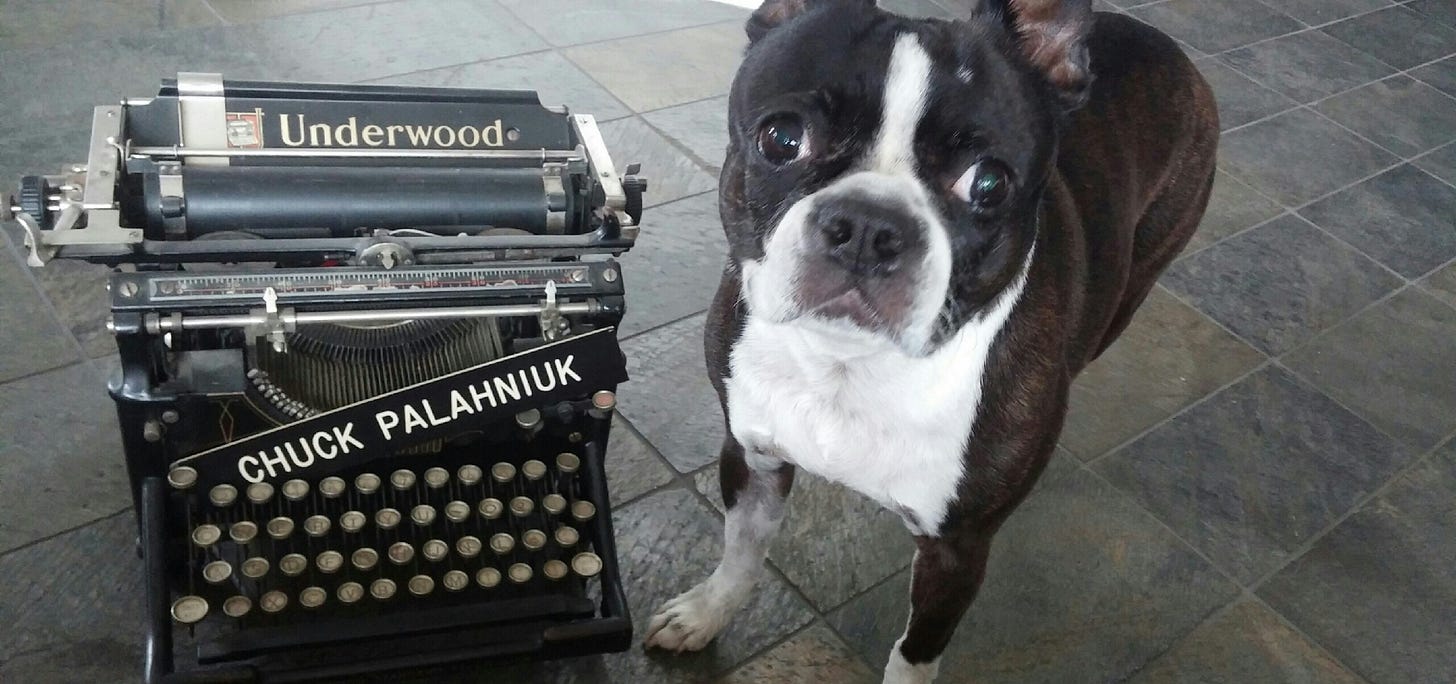May you have a relentless bulldog for an editor. Alice Turner, the fiction editor at Playboy for two decades was one such editor. Amy Grace Lloyd, Turner’s eventual replacement, is another.
Doug Coupland, the author of Generation X and Shampoo Planet and Microserfs once told me that he wished his editors had been more brutal and rigorous. Instead of allowing him to skate on his success, he wished editors had pushed him to grow more as a writer. He felt his books would’ve been better if he’d been constantly held to a rising standard. 12
Hearing that, I wish he’d worked with Amy Grace Lloyd who kept after me for a year to write a piece for Scribd, praising and questioning my work until I’d taken the essay to places where I’d sworn I’d never go. Before that she’d coached me through a long story, called Phoenix, for the Byliner platform. Amy is a force of nature and takes no shit.
As is another editor I might mention. One night in -- 1993? 1994? -- my phone rang, and it was a friend, Ken Foster, calling from New York City. Ken had been a student with me in Tom Spanbauer’s workshop. Disaster had always stalked Ken. He’d wreck his car. He’d need a new place to live. His hang-dog life prompted another writer, Joanna Rose, to dub him “Miserable Ken Foster Child” and that became his nickname.
Ken had fled Portland for New York with the idea that being closer to big publishers would get him a book contract. He’d become an organizer of the prestigious author reading series City Lights. And, for a time, the organizer of the reading series at the KGB literary bar in the East Village. A budding insider. But one night he phoned me, almost shouting, and demanded, “What are you doing?” He continued, “I’m at a party at George Plimpton’s house and W.W. Norton editor Gerry Howard is raving to all the guests about – you!”
Back then, living in my 300-square-foot shack I was the ultimate outsider. An early draft of Invisible Monsters had landed me an agent, and Gerry Howard had been among a few editors who’d liked it but hadn’t gotten the backing needed to offer me a contract. Still, Gerry was slugging away on my behalf, and it was Gerry who’d buy Fight Club and launch my career. In addition, Gerry would introduce me to magazine editors, among them Bill Buford and Charis Conn, people who could offer me freelance jobs in the big-circulation glossies, a showcase where a writer could build a readership.
For a longer discussion about whether to court publishing in New York or to stay home and write, look for the essay collection MFA vs. NYC edited by Chad Harbach.
In those bygone years a group had began to haunt author readings. They’d blow up balloons and pop them as an author tried to present a story. They’d bray laughter during the sad parts of a reading or shout or otherwise just spoil the mood. The group called themselves the Underground Literary Alliance (ULA), and they staged these disruptions as political protests. They held that the gatekeepers in Big Publishing allowed only certain writers to reach a world audience. Many of these writers, the ULA insisted were already wealthy but still were awarded the big-money grants and prizes. Monies that would be better used to support unknown writers like those in the alliance.
At a KGB Bar reading by Vanity Fair books editor Elissa Schappell the ULA harangued her to tears, and when her supporters pushed back a fight broke out. A reading by Sam Lipsyte at Housing Works also turned into a free-for-all. For an overview, check out this article by Tom Bissell in The Believer.
None of these hijinks escaped Gerry Howard’s attention. Gerry was always looking for the next bleeding-edge writer. The bloodier the better.
Gerry was always looking for the next bleeding-edge writer. The bloodier the better.
At one long-ago dinner party I listened as a table of publishing folk discussed “Gerry’s Boys.” The term referred to authors coached by him, and included Jim Carroll3, William Burroughs, David Foster Wallace, Bret Easton Ellis, Irving Welsh and me. The consensus was that Gerry’s Boys generally met a grim end. Someone noticed I was present, and the conversation faltered and jerked abruptly to a new subject. I’ve felt slightly doomed ever since.
Curious about the ULA antics, Gerry invited the group to meet with him and present their best work. Gerry is nothing if not a fan of transgressive fiction and guerrilla marketing. The ULA came to the meeting, and they had nothing to show him. Despite all their demands to be heard, they came empty handed. Instead, they proposed that if Gerry would sign them each to contracts with six-figures in advance money, then they’d deign to write their books.
I’ve felt slightly doomed ever since.
Publishing didn’t work that way, Gerry explained. He offered to meet again once the group had work to offer. They never met again. The protests tapered off and ended. Not long after, the ULA disappeared.
In 2009, Gerry was honored with the Maxwell Perkins Award for Distinguished Achievement in the Field of Fiction. When B.R. Myers wrote A Reader’s Manifesto and trashed E. Annie Proux, Cormac McCarthy, Paul Auster, David Guterson, and Don DeLillo, it was Gerry Howard who waded into the fray to defend those writers. Gerry retired in December 2020. He’s currently working on his own first book, a biography of the editor who campaigned for William Faulkner’s legacy at a time when the author’s work had been all but forgotten.
Someday, may you have such an editor. To revisit the opening of this post, may you have a ruthless, unstoppable Alice or Amy or Gerry to push you.
Even more important, all the balloon-popping political action in the world won’t make you a writer. When you hook an editor’s attention… Or an agent’s, you’d better have work ready. The secret to success as a writer is you must produce work.
Yesterday’s Quiz was a blast. Thank you. More to Come.
An aside about Doug C. For most of his writing career he’s made it a ritual to start work on each new project while seated in the same place in the same Denny’s restaurant in Las Vegas. Good work habits die hard. Exactly which Denny’s, he won’t tell me. My impression is that it’s the Denny’s at 6300 W. Charleston Boulevard. Now, exactly which table? That table needs a bronze plaque.
Doug’s modestly is a major part of his charm.
Indulge me here. I love the song People Who Died, and “list” songs in general. Think of songs like Depeche Mode singing Route 66 and its list of towns. Or the B-52 doing 52 Girls. Or The Nails doing 88 Lines About 44 Girls. Bret Ellis and I have talked long hours about how lists are the unappreciated form in fiction. From the guest lists written on the train schedule in The Great Gatsby to the guest list in Ellis’s Glamorama, lists rock.








Kimber! Winner that you are, The Cult still awaits your mailing details for the prize.
"Curious about the ULA antics, Gerry invited the group to meet with him and present their best work. Gerry is nothing if not a fan of transgressive fiction and guerrilla marketing. The ULA came to the meeting, and they had nothing to show him. Despite all their demands to be heard, they came empty handed. Instead, they proposed that if Gerry would sign them each to contracts with six-figures in advance money, then they’d deign to write their books."
Oh man, if this doesn't scream Millennial Snowflake I don't know what does (curious though when exactly this meeting took place, and whether the ULA were comprised more of Millennials or Gen X). Says a lot about our current socio-political moment. I think Gerry showed exactly how to deal with people like this.